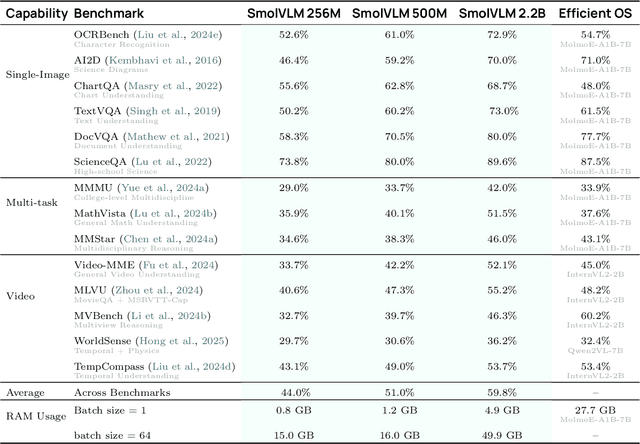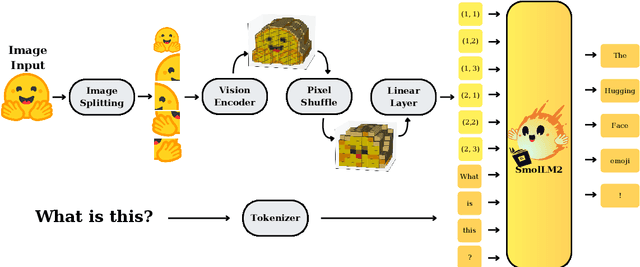Merve Noyan
SmolVLM: Redefining small and efficient multimodal models
Apr 07, 2025



Abstract:Large Vision-Language Models (VLMs) deliver exceptional performance but require significant computational resources, limiting their deployment on mobile and edge devices. Smaller VLMs typically mirror design choices of larger models, such as extensive image tokenization, leading to inefficient GPU memory usage and constrained practicality for on-device applications. We introduce SmolVLM, a series of compact multimodal models specifically engineered for resource-efficient inference. We systematically explore architectural configurations, tokenization strategies, and data curation optimized for low computational overhead. Through this, we identify key design choices that yield substantial performance gains on image and video tasks with minimal memory footprints. Our smallest model, SmolVLM-256M, uses less than 1GB GPU memory during inference and outperforms the 300-times larger Idefics-80B model, despite an 18-month development gap. Our largest model, at 2.2B parameters, rivals state-of-the-art VLMs consuming twice the GPU memory. SmolVLM models extend beyond static images, demonstrating robust video comprehension capabilities. Our results emphasize that strategic architectural optimizations, aggressive yet efficient tokenization, and carefully curated training data significantly enhance multimodal performance, facilitating practical, energy-efficient deployments at significantly smaller scales.
AfroDigits: A Community-Driven Spoken Digit Dataset for African Languages
Apr 04, 2023Abstract:The advancement of speech technologies has been remarkable, yet its integration with African languages remains limited due to the scarcity of African speech corpora. To address this issue, we present AfroDigits, a minimalist, community-driven dataset of spoken digits for African languages, currently covering 38 African languages. As a demonstration of the practical applications of AfroDigits, we conduct audio digit classification experiments on six African languages [Igbo (ibo), Yoruba (yor), Rundi (run), Oshiwambo (kua), Shona (sna), and Oromo (gax)] using the Wav2Vec2.0-Large and XLS-R models. Our experiments reveal a useful insight on the effect of mixing African speech corpora during finetuning. AfroDigits is the first published audio digit dataset for African languages and we believe it will, among other things, pave the way for Afro-centric speech applications such as the recognition of telephone numbers, and street numbers. We release the dataset and platform publicly at https://huggingface.co/datasets/chrisjay/crowd-speech-africa and https://huggingface.co/spaces/chrisjay/afro-speech respectively.
 Add to Chrome
Add to Chrome Add to Firefox
Add to Firefox Add to Edge
Add to Edge